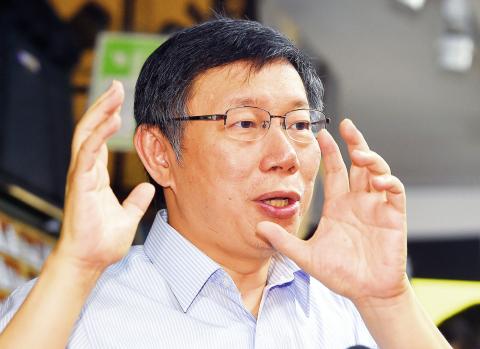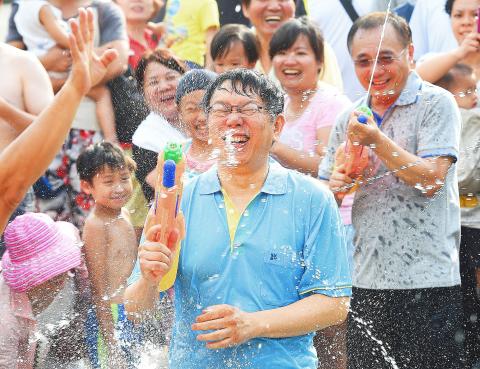Taipei Mayor Ko Wen-je (柯文哲) yesterday said he would attend a Taipei-Shanghai forum “if there is the opportunity” to do so, following media reports that negotiations between Taipei and Shanghai over this year’s summit had broken down.
“There will always be discussion and compromise over anything as important as this, so it would not be accurate to say that everything is going smoothly,” Ko said. “Instead, one should say that everything is still moving forward.”
The Chinese-language China Times reported that negotiations over the forum — which is held annually between the two city governments — were at a standstill for this year’s event after Ko rejected Shanghai’s demands to demonstrate greater “goodwill.”

Photo: Liao Chen-huei, Taipei Times
Ko said that the so-called “1992 consensus” — which Beijing insists must be the foundation of cross-strait talks — was the main issue of contention.
He said that he felt that “content” is more important than “labels,” adding that the Chinese Communist Party has historically been “pragmatic.”
The “1992 consensus” — a term former Mainland Affairs Council chairman Su Chi (蘇起) admitted making up in 2000 — refers to a supposed understanding between the Chinese Nationalist Party (KMT) and the Chinese government that both Taiwan and China acknowledge there is “one China,” with each side having its own interpretation of what “China” means.

Photo: Liao Chen-huei, Taipei Times
While Shanghai Mayor Yang Xiong (楊雄) said the forum can be continued only if the “1992 consensus” is used as a basis for talks, Ko has said his position is that cross-strait exchanges should respect the past “history of interactions” and be conducted based on the “present political foundation.”
Ko said that his “2015 viewpoint” was at least “tolerable” to both sides, adding that he was subject to pressure domestically as well as from China.
He added that the Taipei City Government hoped Shanghai’s leadership would visit Taipei in the near future for further negotiations, following visits by Taipei Deputy Mayor Chou Li-fang (周麗芳) to Shanghai and Xiamen last month.
Taipei Mainland Affairs Committee member Chiu Pei-lin (邱珮琳) said that no response to Shanghai’s demands was passed at last week’s committee meeting, because committee members were unsure what was meant by “goodwill.”
Committee member Chang Jung-feng (張榮豐) said that Shanghai had not defined “goodwill,” making it difficult to reply.
Chang said that the committee had discussed downgrading the summit so that deputy mayors could lead the delegations from each side.
Shanghai has not ruled out sending a representative to Taipei for further discussions, Chang added.
“We are not required to continue everything that was done by the [previous administration of the] KMT,” he said, adding that if the forum continued to take place, the Taipei City Government would take along a range of civil groups, in contrast to the previous city administration’s focus on corporations.
The annual forum, which was initiated in 2001 by civic groups as a channel for exchanges between the largest Taiwanese and Chinese cities, was organized at an official level in 2010 in Taipei for the first time.
Since then, the two cities have taken turns hosting the meetings.
Additional reporting by staff writer

INVESTIGATION: The case is the latest instance of a DPP figure being implicated in an espionage network accused of allegedly leaking information to Chinese intelligence Democratic Progressive Party (DPP) member Ho Jen-chieh (何仁傑) was detained and held incommunicado yesterday on suspicion of spying for China during his tenure as assistant to then-minister of foreign affairs Joseph Wu (吳釗燮). The Taipei District Prosecutors’ Office said Ho was implicated during its investigation into alleged spying activities by former Presidential Office consultant Wu Shang-yu (吳尚雨). Prosecutors said there is reason to believe Ho breached the National Security Act (國家安全法) by leaking classified Ministry of Foreign Affairs information to Chinese intelligence. Following interrogation, prosecutors petitioned the Taipei District Court to detain Ho, citing concerns over potential collusion or tampering of evidence. The

NEGOTIATIONS: Taiwan has good relations with Washington and the outlook for the negotiations looks promising, Minister of Economic Affairs J.W. Kuo said Taiwan’s GDP growth this year is expected to decrease by 0.43 to 1.61 percentage points due to the effects of US tariffs, National Development Council (NDC) Minister Paul Liu (劉鏡清) said at a meeting of the legislature’s Economics Committee in Taipei yesterday, citing a preliminary estimate by a private research institution. Taiwan’s economy would be significantly affected by the 32 percent “reciprocal” tariffs slapped by the US, which took effect yesterday, Liu said, adding that GDP growth could fall below 3 percent and potentially even dip below 2 percent to 1.53 percent this year. The council has commissioned another institution

NEGOTIATIONS: The US response to the countermeasures and plans Taiwan presented has been positive, including boosting procurement and investment, the president said Taiwan is included in the first group for trade negotiations with the US, President William Lai (賴清德) said yesterday, as he seeks to shield Taiwanese exporters from a 32 percent tariff. In Washington, US Trade Representative Jamieson Greer said in an interview on Fox News on Thursday that he would speak to his Taiwanese and Israeli counterparts yesterday about tariffs after holding a long discussion with the Vietnamese earlier. US President Donald Trump on Wednesday postponed punishing levies on multiple trade partners, including Taiwan, for three months after trillions of US dollars were wiped off global markets. He has maintained a 10 percent

TRADE: The premier pledged safeguards on ‘Made in Taiwan’ labeling, anti-dumping measures and stricter export controls to strengthen its position in trade talks Products labeled “made in Taiwan” must be genuinely made in Taiwan, Premier Cho Jung-tai (卓榮泰) said yesterday, vowing to enforce strict safeguards against “origin laundering” and initiate anti-dumping investigations to prevent China dumping its products in Taiwan. Cho made the remarks in a discussion session with representatives from industries in Kaohsiung. In response to the US government’s recent announcement of “reciprocal” tariffs on its trading partners, President William Lai (賴清德) and Cho last week began a series of consultations with industry leaders nationwide to gather feedback and address concerns. Taiwanese and US officials held a videoconference on Friday evening to discuss the